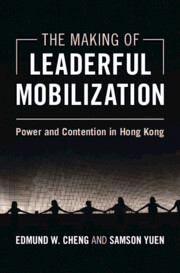Book contents
- Reviews
- The Making of Leaderful Mobilization
- Cambridge Studies in Contentious Politics
- The Making of Leaderful Mobilization
- Copyright page
- Dedication
- Contents
- Figures
- Tables
- Preface
- Acknowledgements
- Notes on Transliteration
- Abbreviations
- 1 Introduction
- Part I Context
- Part II Episodes
- Part III Mechanisms
- 6 Sectoral Networks
- 7 Loss of Innocence
- 8 Peer Collaboration
- 9 Money Matters
- 10 Radicalization with Solidarity
- 11 Conclusion
- Appendices
- References
- Index
7 - Loss of Innocence
from Part III - Mechanisms
Published online by Cambridge University Press: 30 January 2025
- Reviews
- The Making of Leaderful Mobilization
- Cambridge Studies in Contentious Politics
- The Making of Leaderful Mobilization
- Copyright page
- Dedication
- Contents
- Figures
- Tables
- Preface
- Acknowledgements
- Notes on Transliteration
- Abbreviations
- 1 Introduction
- Part I Context
- Part II Episodes
- Part III Mechanisms
- 6 Sectoral Networks
- 7 Loss of Innocence
- 8 Peer Collaboration
- 9 Money Matters
- 10 Radicalization with Solidarity
- 11 Conclusion
- Appendices
- References
- Index
Summary
Chapter 7 examines how secondary school action groups, established by students in their respective schools, played a crucial role in mobilizing teenagers against the extradition bill by tapping into and leveraging their latent social capital. Utilizing Instagram as a platform, these groups facilitated connections among students within and across schools, often by capitalizing on their schools’ identities and leveraging various sources of social capital tied to those identities. This enabled loose and fragmented social networks can be mobilized in social movements, provided that they can activate their latent social capital.
Keywords
Information
- Type
- Chapter
- Information
- The Making of Leaderful MobilizationPower and Contention in Hong Kong, pp. 157 - 172Publisher: Cambridge University PressPrint publication year: 2025
